Summary | Excerpt | Reading Guide | Discuss | Reviews | Beyond the Book | Read-Alikes | Genres & Themes | Author Bio

Critics' Opinion:
Readers' Opinion:
First Published:
Sep 2019, 448 pages
Paperback:
Oct 2020, 448 pages
 Book Reviewed by:
Book Reviewed by:
Elisabeth Cook
Buy This Book
This article relates to The Shadow King

In The Shadow King by Maaza Mengiste, Hirut has a particular attachment to a rifle that her father gave her, a Wujigra, which she goes out of her way to retrieve after Kidane takes it away from her while stockpiling weapons for his army. "Wujigra" is the Ethiopian term for the Fusil Gras, a French service rifle that was manufactured in the late 19th century. It is a single-shot rifle with a reputation for being robust, as is described in Mengiste's book: "A bolt-action, 11mm rifle designed to deliver a single lethal shot with consistent accuracy, a hardy gun able to withstand cold and rain, repeated and rapid firing."
The Fusil Gras was developed as an adaptation of the breech-loading Chassepot rifle and as a response to the German Mauser. It was named after Basile Gras, who created the gun by converting the Chassepot, which fired combustible paper cartridges holding lead bullets, to work with metallic ammunition that eliminated the issue of residue accumulating inside the gun. The Fusil Gras became the standard service rifle used in the French Army from 1874 to 1886. It was also used by Belgian soldiers during World War I after undergoing modifications.
Before the Italian invasion of Ethiopia in the 1930s, which is depicted in The Shadow King, guns, including the Fusil Gras, had already played a crucial part in preserving Ethiopian independence. During the Scramble for Africa (1880s-1914), a period of invasion and colonization of the continent by foreign powers, Ethiopia fared uniquely well among African nations, perhaps most notably in the Battle of Adua (a.k.a. Adwa or Adowa) in 1896, which was significant for resulting in the definitive defeat of a European power by an African population. (In fact, Ethiopia is widely considered to be the only African country to successfully resist European colonization.) Kidane mentions this event while taking Hirut's gun, saying, "My father used one in the battle at Adua when we faced these Italians the first time." The Fusil Gras was imported by Emperor Melinek in the late 19th century as part of a gradual effort to arm the country against the possibility of an Italian attack.
The separate Ethiopian word for the Fusil Gras, "Wujigra," is reflective of a larger trend by which the names of foreign-manufactured guns and gun-related terminology were integrated into the Amharic language due to the importance of firearms in the country's culture and history. According to Richard Pankhurst, author of the Transition article "Guns in Ethiopia," "Historically guns were more or less the first mechanical instruments with which the Ethiopians became familiar, as is apparent from the fact that the Amharic term for screw driver is temanja metcha, or instrument for unscrewing a gun." The names of different makes of rifles became common knowledge in the country and entered Amharic over time. Pankhurst explains that this often happened through corruptions of the original names, giving "Wujigra" for "Fusil Gras" as one example and "Sinidir" for "Winchester Snider" as another.
By the time of their invasion in the 1930s, the Italians had developed more advanced weaponry — such as tanks — and older weapons like the Wujigra proved to be less effective in battle, as is demonstrated in Mengiste's novel, where the gun malfunctions at a crucial moment. However, the rifle is important to Hirut in a way that emphasizes its personal value to her and the wider significance of guns in Ethiopian culture.
1874 model Fusil Gras, courtesy of Proxibid
Filed under People, Eras & Events
![]() This article relates to The Shadow King.
It first ran in the October 21, 2020
issue of BookBrowse Recommends.
This article relates to The Shadow King.
It first ran in the October 21, 2020
issue of BookBrowse Recommends.





The House on Biscayne Bay
by Chanel Cleeton
As death stalks a gothic mansion in Miami, the lives of two women intertwine as the past and present collide.

The Flower Sisters
by Michelle Collins Anderson
From the new Fannie Flagg of the Ozarks, a richly-woven story of family, forgiveness, and reinvention.

The Funeral Cryer by Wenyan Lu
Debut novelist Wenyan Lu brings us this witty yet profound story about one woman's midlife reawakening in contemporary rural China.
Your guide toexceptional books
BookBrowse seeks out and recommends the best in contemporary fiction and nonfiction—books that not only engage and entertain but also deepen our understanding of ourselves and the world around us.